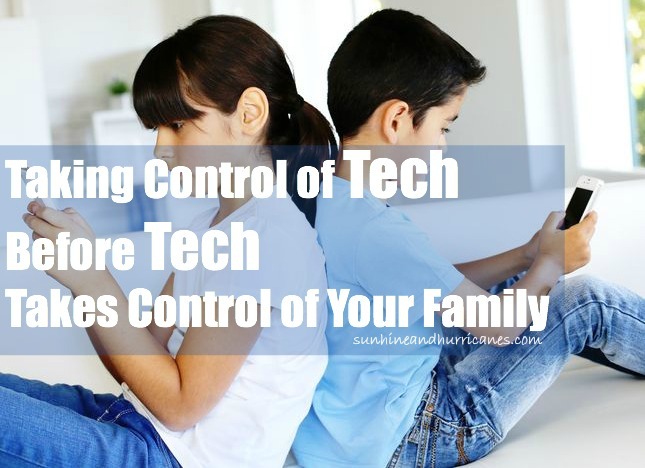Now that we’ve posted our first few articles in our Technology 101 for Parents Series, I’ve been noticing many of the comments from parents frustrated by the constant struggle technology seems to present in their families. Here are some of the most common things I’ve heard parents say over the last few weeks:
“I can’t get my kids to stop playing on their DS/Wii/Playstation/iPad/Phone”
“Anytime I tell them to turn it off, it turns into a major battle”
“It feels like technology is taking over our lives”
While I absolutely sympathize and I understand how managing technology and our kids can feel overwhelming for parents, we really do have the ability to take control of technology before technology takes over our families.
Step 1
Well, I think there is an obvious starting place for this conversation – it’s us parents. Before we can even begin to help our children to make wise choices when it comes to technology use, we have to ask ourselves exactly what behaviors are we modeling? If we aren’t exercising discipline and we’re constantly on our devices, we can’t expect anything different from our children.
“What you do speaks so loudly that I cannot hear what you say.” ~Ralph Waldo Emerson
Step 2
We need some basic rules and boundaries that we’ve actually discussed with our kids and that we are sure they understand. So, here are some “house tech rules” that should help tame the technology monster that has taken over your household. (there’s a super cute printable at the end of the post. Hang it over your family computer or on the fridge to serve as reminder for your kids and for you)
1. Technology is a Privilege Not a Right
As parents we ARE obligated to provide some basics to our children. These are their rights as our children and include things like food, shelter, clothes, a K-12 education and our love. Nowhere in the parent agreement does it state we MUST provide them with a TV, an iPhone, an iPad, a Computer, two different gaming systems with games for each and endless hours utilizing these various technologies. Those are NOT rights.
I have told my children for several years now, “your expectation for technology time should be zero, anything you get above that should be considered a privilege.” Then I make a cute little “zero” with my hands together kind of like the little hand hearts young people like to make these days. This helps them to understand that having technology available and being given the opportunity to use it is not an automatic, they have to hold up their end of being part of our family or else technology is the first thing to go. It also helps them to be appreciative of technology time when they have it.
2. All Technology Must Be Parent Approved
Whether it’s watching a certain television show, downloading a new app, using our family computer (which sits in our open living room by the way so we can always monitor them on it) or purchasing a new video game, they MUST ask our permission. If they do not, and this includes at other people’s houses, and we find out then it results in a TOTAL loss of all technology. Each family has to determine for themselves the length of the time-out from tech based on the offense, but this is a zero tolerance policy and we as parents should NEVER make an exception.
If you are unsure about whether or not something is appropriate for your child – A simple visit to Common Sense Media should provide you with all the info you need.
3. We Value People More Than Technology
How often has your child completely ignored a request you’ve made b/c they are zombified by the TV or else maybe you’ve heard your children using unkind words when they are playing a video game with a friend or sibling. Our children need to be taught to value their relationships and that those relationships should always be put first.
If my child fails to respond to me, because they are too absorbed in technology, then the technology gets turned off for the rest of the day and sometimes the rest of the week.
When it comes to how we treat people when technology is involved, whether it’s smack talk gone too far when playing video games or for older kids it could be using texting or social media to be cruel to another child, I once again will remove the technology at that moment. However, we will talk about why they made the choices they did and how to be better next time. If the behavior becomes repetitive, then we “take a break” for a determined amount of time until they can prove they are deserving of another opportunity.
4. Devices Don’t Come to the Dinner Table
Period. End of Story. The End. This is the best chance we have as parents to connect with our children and find out what is going on in their lives. If everyone is too busy with tech, then we lose out on this important family time.
5. There is No Tech Behind Closed Doors
There is plenty of evidence to support that when children have TV’s, computers and other technology in their bedrooms it is not a great idea. However, this is really a family by family choice. Whatever you choose though, there is NEVER a reason that a child (toddler to teen) needs to have technology of any kind behind a closed door. It simply invites trouble and while most of us want to trust our kids, why provide temptation that isn’t absolutely necessary.
6. Chores and Homework Come Before TV and Video Games
This goes back to technology being a privilege and not a right. Our kids need to be able to put their responsibilities to their family first and also to adopt the work before play principle. This is also a step in teaching our children about priorities and how to put first things first.
7. Turn it Off is NOT a Negotiation
I do not demand my children turn off the TV or quit a game they are playing on our iPad without some warning, this is only fair. I will give at least a five minute notice before I am expecting them to turn it off. However, after the grace period is up, I’ve made it clear that they should not beg for more time, whine and complain, or even worse, have some sort of tantrum. In the event this occurs, no more technology privileges for a set period of time. When they get tech time back, I remind them why they lost it and that they will have the same consequence doubled if it happens again.
8. We Break It We Help Pay to Replace It
Let’s face it, most technology is expensive. It is okay to talk with our kids about the investment made in a purchase and the importance of caring for our possessions properly. For our littles, we need to show them the right and wrong way to handle these different devices and for all our kids there should be an established safe place to put things when they are done using them. If our kids are careless, then they absolutely need to, at a minimum, share the burden of paying for a replacement. For older kids this money can come out of an allowance or savings or they can do extra chores to earn the money to help replace the broken item. Younger children may not be able to monetarily help, but it may mean an item just isn’t replaced or else if it is, they no longer can use it.
9. We Use Technology Appropriately or We Lose It
Using tech in a way that could potentially harm any human being, including oneself is inappropriate. This means you’re going to need to have age appropriate conversations with your child about the dangers that exist online. There needs to be a clear understanding about the language & photos that are acceptable vs. unacceptable to be placed online. Do not assume your child “knows better”, be blunt & state the obvious. We also need to coach them on appropriate social etiquette and how to be respectful online. Children, and many adults, feel a false sense of anonymity when they are interacting with others online and may act in ways or say things that they never would in other situations.
We can have good kids, but that doesn’t mean they will ALWAYS make good decisions. Children do not have fully developed decision making capabilities or the ability to think through their decisions to the long-term consequences even in their teens. That is why they are ours until they are at least 18. If they do not demonstrate the maturity necessary to handle different aspects of technology appropriately, then they don’t deserve to have the technology. Both for their safety and the safety of others. Don’t be afraid to be the bad guy, you know your child better than anyone and it is your job to be their parent, not their friends.
“If we do not teach our children, society will.
And they-and we-will live with the results.”
– Stephen Covey
Below you will find a link for this Family Technology Rules Printable. We will also be publishing another post in the Technology 101 for Parents Series soon geared towards older children and establishing a family technology contract. You won’t want to miss it, so be sure to sign up for our weekly email newsletter: http://eepurl.com/WXOv5






















